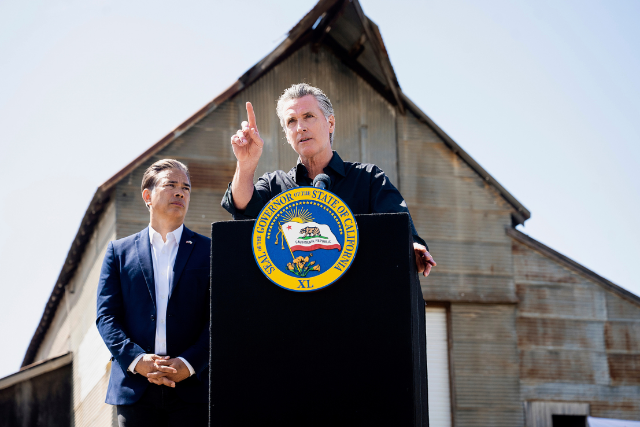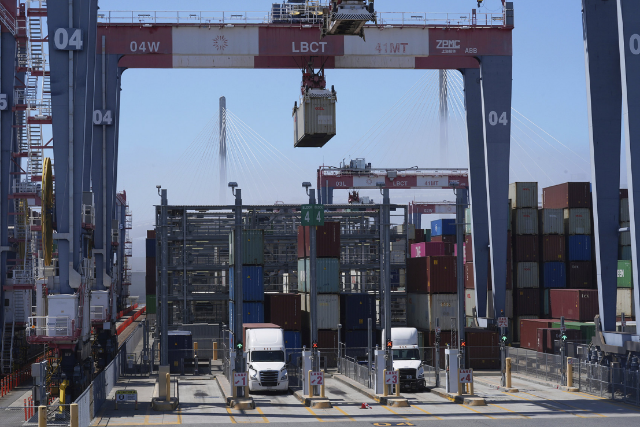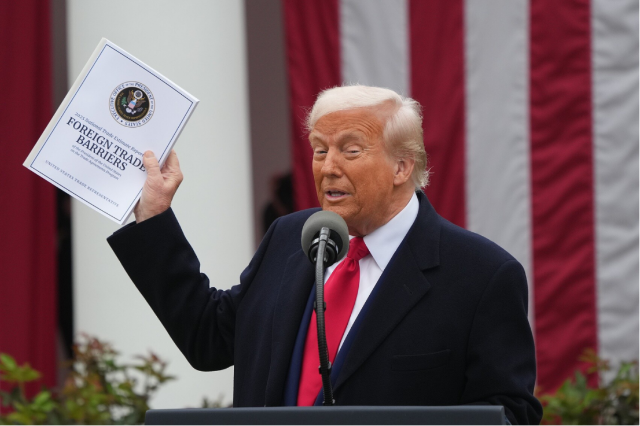On April 16, California became the first U.S. state to sue the Trump administration over its recent tariff policies. Governor Gavin Newsom and State Attorney General Rob Bonta announced the lawsuit, alleging that the administration's unilateral imposition of tariffs—reportedly up to 245% on goods from China—violates federal law and harms the state's economy. The lawsuit, filed in a California court, seeks to invalidate the tariffs and block their enforcement.

California Gov. Gavin Newsom speaks at a press conference about President Donald Trump's tariffs on April 16, 2025 (Photo: CFP)
President Trump invoked the International Emergency Economic Powers Act (IEEPA) to impose tariffs without congressional approval. However, Governor Newsom contends that the law does not grant Trump the authority to levy such tariffs on imports from China, Mexico, and Canada.
A Californian roar
Earlier, on April 14, a similar lawsuit was filed by local businesses seeking to stop the tariffs. This legal pushback echoes bipartisan efforts in the U.S. Congress since Trump announced his "reciprocal tariff," where lawmakers have repeatedly sought to pass legislation curtailing presidential power to unilaterally enact tariffs.
Newsom criticized the tariffs for causing "economic chaos," including supply chain disruptions, rising consumer prices, and threats to jobs.
According to data released by the U.S. Bureau of Economic Analysis (BEA), California's GDP reached $4.10 trillion last year, marking a 6.01% year-on-year increase and accounting for 14.14% of the nation's total economic output.
For decades, California has been heavily reliant on global trade. The state's trade totaled $675 billion in 2024, with over 40% of its imports originating from China, Mexico, and Canada. These three nations account for one-third of the state's $183 billion annual exports.

Shipping containers are loaded onto waiting trucks at the Long Beach Container Terminal in Long Beach, California (Photo: CFP)
Key industries, from Silicon Valley's tech sector to agriculture, depend on imports and exports. These sectors generate 4.1 million trade-dependent jobs in California.
Supply chain intelligence firm Vizion's latest metrics reveal a dramatic plunge in U.S.-bound container bookings during the first week of April, with a 67% decrease for imports and a 40% drop for export shipments.
For small and medium-sized enterprises (SMEs) like Beth Berneck's BabySafe Inc., Trump's "reciprocal tariffs" have transformed supply chains into minefields. Her Los Angeles-based company, dependent on Chinese-made safety-certified crib components, now faces 37.6% duty hikes.
"This isn't gradual adaptation. We're looking at inventory depletion within 90 days," Berneck testified at last week's U.S. International Trade Commission hearing, echoing the National Small Business Association's finding that 61% of members lack the financial cushion to absorb tariff shocks beyond six weeks.
And the winner is...
From a legal standpoint, if the lawsuit prevails in the lower court, it could temporarily suspend the tariffs. However, the Trump administration is expected to appeal to the Supreme Court, where conservatives hold a 6-3 majority. Historically, no state has ever successfully challenged federal tariff authority. Yet California, a Democratic stronghold, may ignite a judicial domino effect. Analysts predict that over a dozen states, including New York and Illinois, could follow suit, sparking a nationwide "anti-tariff wave" that undermines the legitimacy of Trump's policies.

Donald Trump holds a "Foreign Trade Barriers" report as he makes remarks at a "Make America Wealthy Again" event in Washington, DC, on April 2, 2025. (Photo: CFP)
Economically, the tariffs have already cost California an estimated $15 to $25 billion, which marks 0.4% to 0.6% of its GDP. A favorable court ruling could partially mitigate these losses by suspending the policy. The Milken Institute warns, however, that permanent supply chain relocations to Mexico and Southeast Asia, which have increased by 19% since 2022, will leave lasting scars on the state's trade-dependent industries.
For some, the legal action appears to be a political show for Newsom. Governor Newsom aims to solidify his "anti-Trump crusader" persona and bolster his credentials as a progressive leader. Widely seen as a rising star in the Democratic Party, Newsom's moves are interpreted as groundwork for a 2028 presidential bid.
His polling currently ranks second among potential Democratic candidates. The lawsuit also serves as a rallying cry for the 2026 midterms. By aligning with trade-heavy states like Washington and New York, California could threaten Republican control of the House, targeting 17 GOP-held districts reliant on port economies.
If California wins, it is likely that New York and other trade-dependent states will replicate the strategy, forcing Congress and the courts to redefine presidential trade authority.
Crucially, the case exposes the self-inflicted wounds of Trump's "America First" agenda. Republican-leaning agricultural states like Iowa and Texas have suffered 22% income drops due to retaliatory tariffs, according to USDA data.
When push comes to shove
In fact, the current legal conflict mirrors earlier partisan clashes. The pendulum of political strategy has swung full circle—tactics once deployed by Republican states now empower Democrats in their constitutional clash with Trump's governance.
Back in 2023, Republican-led Texas, under Governor Greg Abbott, defied Biden's immigration policies by deploying state forces to secure the U.S.-Mexico border. Twenty-five percent of GOP governors backed Texas, prompting a standoff with federal authorities.
California's lawsuit now follows a comparable strategy, leveraging state power to counter federal mandates, a tactic increasingly common in U.S. partisan warfare.
The lawsuit reflects deepening political divisions. Democratic leaders, including former President Biden, have accused the Trump administration of "causing immense damage" through erratic policy shifts. California's action is expected to inspire similar moves by other Democratic-led states, amplifying pressure on the federal government.
Analysts warn that California's 54 electoral votes, if leveraged to form an "anti-tariff coalition," could redraw the U.S. political map for the next presidential election.
The face that California presents to Congress carries unprecedented weight. It leverages its significant demographic and economic prowess to mount challenges that no lone star state could ever sustain.
Reporter: Guo Zedong
Editor: Yuan Zixiang, James, Shen He
















